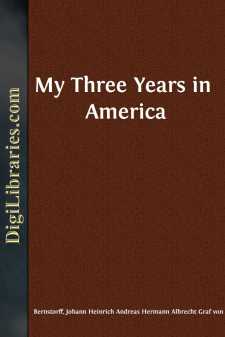Categories
- Antiques & Collectibles 13
- Architecture 36
- Art 48
- Bibles 22
- Biography & Autobiography 813
- Body, Mind & Spirit 142
- Business & Economics 28
- Children's Books 17
- Children's Fiction 14
- Computers 4
- Cooking 94
- Crafts & Hobbies 4
- Drama 346
- Education 46
- Family & Relationships 57
- Fiction 11829
- Games 19
- Gardening 17
- Health & Fitness 34
- History 1377
- House & Home 1
- Humor 147
- Juvenile Fiction 1873
- Juvenile Nonfiction 202
- Language Arts & Disciplines 88
- Law 16
- Literary Collections 686
- Literary Criticism 179
- Mathematics 13
- Medical 41
- Music 40
- Nature 179
- Non-Classifiable 1768
- Performing Arts 7
- Periodicals 1453
- Philosophy 64
- Photography 2
- Poetry 896
- Political Science 203
- Psychology 42
- Reference 154
- Religion 513
- Science 126
- Self-Help 84
- Social Science 81
- Sports & Recreation 34
- Study Aids 3
- Technology & Engineering 59
- Transportation 23
- Travel 463
- True Crime 29
My Three Years in America
Description:
Excerpt
Page 1 INTRODUCTION
MY FUNDAMENTAL POLITICAL VIEWS BEFORE AND DURING THE WAR
It was in my own home, the German Embassy in London, where the atmosphere was entirely political, that I learned my first steps in politics. My father did not belong to that class of diplomats, so prevalent to-day, who treat politics as an occupation to be pursued only in their spare time. His whole life was consecrated to the cause of the German nation, and from my earliest childhood my mind was filled with the same idea, to the exclusion of all others.
Owing to my father's share in the negotiations which brought about the marriage of the Emperor Frederick with the Princess Royal of England, the Imperial couple became closely connected with my parents, and, as Crown Prince and Princess, frequently resided at the Embassy in London. It was the entourage of the Emperor Frederick that first inspired in me those political views, which, during a long diplomatic career, gradually crystallized into the deep-rooted convictions of my political outlook. I believed Germany's salvation to lie in the direction of a liberal development of Unification and Parliamentary Government, as also in an attitude of consistent friendliness towards England and the United States of America. Thus, to use a modern phrase, I Page 2 was an avowed supporter of the Western Policy. At the present moment, while we are standing as mourners at the grave of our national hopes, I am more than ever convinced, that had this policy been steadily pursued, we should have been spared the catastrophe that has overtaken us.
On the other hand, I will not deny, that even the Oriental Policy would have proved a feasible political scheme, if only we had decided to pursue it in good time. Albeit, I am of opinion that even Bismarck had already started us in the direction of the Western Policy, when in 1879 he decided in favor of Austria-Hungary and not Russia. Despite all that the careworn recluse of Friedrichsruhe may have written against Caprivi's policy, which was decidedly Western in tendency, he was himself the founder of the Triple Alliance, which, without the good-will of England, could not have come into existence. Had we pursued an Eastern Policy, though it would ultimately have led to the sacrifice and partition of Austria-Hungary, it would not have secured us those advantages in the Orient of which Marschall speaks. Nevertheless, I have always regretted that we sent such a first-rate man to Constantinople, for him ultimately to become the able director of the false policy which we pursued there. There is an Oriental proverb which says: "Never lay your load on a dead camel's back."
If, as I always used to hope, we had resolved to adopt the Western Policy, we should in any case have had to be prepared, in certain circumstances, to venture with England's help upon a war against Russia. And the experiences of the Five-Years War have taught us that we should have won such a conflict with ease. I never wanted a war with Russia, and was never an enemy of that country; but I believed that our position among the nations of the world would compel us to decide one way Page 3 or the other, and I felt, just as Caprivi did, that we should not very well be able to avoid war....


